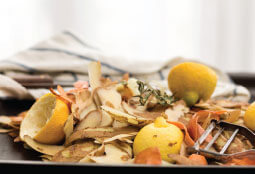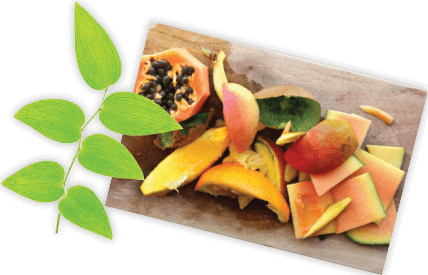Commercial Services
EDCO’s New Organics Recycling Program Collects Food Scraps and Landscape Waste Mixed Together in a Green Organics Container
Buena Park Commercial Organics Mailer
Korean Commercial Organics Mailer
Folleto de Productos Orgánicos Comerciales
Bilingual Commercial Organics Guide
| Recyclable Organics Includes | |
|
|
Place recyclable organics directly into your designated green collection container. Do not use any kind of plastic bags (including certified compostable or biodegradable bags) for any type of green waste, food waste, or other organics collection or disposal, as they contaminate the compost! All organic material must be placed loosely inside the green container for collection. Paper bags are acceptable.
Please do not place any of the following materials in your designated green organics recycling container:
- No plastic bags.
- No trash or hazardous waste.
- No animal waste.
- No dirt, rocks, asphalt, concrete, sand, etc.
- No treated or lead-based painted wood or lumber.
Organic Waste

Organic waste is a renewable natural resource, and it mainly comes from yard and kitchen waste from homes, food waste, and industrial and commercial operations scraps. Mandatory recycling of organic waste is the next step to achieving California’s Zero Waste goals.
Recycling organics will be easy and convenient with EDCO’s commingled Organics Recycling program. EDCO has expanded its source-separated green waste collection to include recycling food waste. The service will allow customers to place food scraps in the same container as green waste. EDCO’s new Organics Recycling program will be a foundation for your community to achieve State mandates, including AB 1826, AB 1594, and SB 1383, which are directly related to organics recycling in the State of California.
EDCO’s Commercial Food Waste Recycling Video
Please watch our informative video to learn more about EDCO’s new Organics Recycling Program and how it will significantly impact the future of organic waste.
Why Recycle Food Waste?
Organic waste accounts for over 40% of California’s waste stream material. Organic material cannot break down when buried in a landfill, as it would in nature or a compost pile, because it decomposes without oxygen, releasing methane gas into the atmosphere.
Organic waste is recycled into valuable compost or mulch used in an organics recycling program for soil restoration. It can also be recycled by anaerobic digestion, producing nutrient-rich biofertilizer, renewable energy, and fuel. By recycling food waste, you extend valuable landfill space, which also reduces CO2 emissions and preserves our environment!

What Will Go in the Green Cart
Below are just a few examples of what can be placed in your green organics cart.

Food Scraps
Fruit, vegetables, meat, bones, dairy, eggshells, prepared food

Food-Soiled Paper
Napkins, tea bags, paper plates, coffee filters

Yard Waste
Plants, leaves, branches, grass


What Can You Do Now?
In the United States alone, a shocking 40% of food is uneaten, wasted, and discarded. We, as consumers, are the largest producers of food waste, believe it or not, exceeding grocery stores and restaurants combined! So, the smallest changes add up and make a huge difference. Food Finders is a non-profit food recovery organization that aims to eliminate hunger and food waste while improving nutrition in food-insecure communities. This supports pantries, shelters, agencies, missions, and more within a large part of the Southern California region. Food Finders coordinates all logistics of picking up and distributing your donated food, delivering same-day to a partner agency within your local area. No food is too small or too big, whether it’s perishable, nonperishable, or prepared food. Call (562) 283-1400 or visit foodfinders.org to learn more.
Please visit our Resource Center for additional information, including informative videos, recycling guides, and service brochures.
Your Service Area
You are currently viewing services for Buena Park. Enter a zip code to if you want to switch to another location.